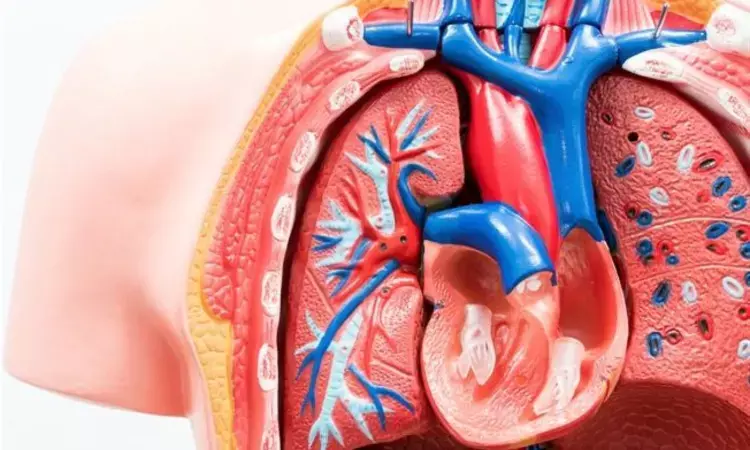- Home
- Medical news & Guidelines
- Anesthesiology
- Cardiology and CTVS
- Critical Care
- Dentistry
- Dermatology
- Diabetes and Endocrinology
- ENT
- Gastroenterology
- Medicine
- Nephrology
- Neurology
- Obstretics-Gynaecology
- Oncology
- Ophthalmology
- Orthopaedics
- Pediatrics-Neonatology
- Psychiatry
- Pulmonology
- Radiology
- Surgery
- Urology
- Laboratory Medicine
- Diet
- Nursing
- Paramedical
- Physiotherapy
- Health news
- Fact Check
- Bone Health Fact Check
- Brain Health Fact Check
- Cancer Related Fact Check
- Child Care Fact Check
- Dental and oral health fact check
- Diabetes and metabolic health fact check
- Diet and Nutrition Fact Check
- Eye and ENT Care Fact Check
- Fitness fact check
- Gut health fact check
- Heart health fact check
- Kidney health fact check
- Medical education fact check
- Men's health fact check
- Respiratory fact check
- Skin and hair care fact check
- Vaccine and Immunization fact check
- Women's health fact check
- AYUSH
- State News
- Andaman and Nicobar Islands
- Andhra Pradesh
- Arunachal Pradesh
- Assam
- Bihar
- Chandigarh
- Chattisgarh
- Dadra and Nagar Haveli
- Daman and Diu
- Delhi
- Goa
- Gujarat
- Haryana
- Himachal Pradesh
- Jammu & Kashmir
- Jharkhand
- Karnataka
- Kerala
- Ladakh
- Lakshadweep
- Madhya Pradesh
- Maharashtra
- Manipur
- Meghalaya
- Mizoram
- Nagaland
- Odisha
- Puducherry
- Punjab
- Rajasthan
- Sikkim
- Tamil Nadu
- Telangana
- Tripura
- Uttar Pradesh
- Uttrakhand
- West Bengal
- Medical Education
- Industry
New Embolic Protection Device promising in providing embolic protection during TAVR Transcatheter Aortic Valve Replacement

Transcatheter aortic valve replacement (TAVR) is a life-saving procedure for patients with aortic valve disease, but it comes with certain risks, including the potential for embolic complications like stroke.
Researchers have found in a new study that the Captis full-body embolic protection system successfully collected a lot of debris from transcatheter aortic valve replacement. It is promising in providing embolic protection during TAVR.
The study was published in EuroIntervention by Danenberg H. and colleagues. The study aimed to investigate the safety, feasibility, and debris-capturing ability of the CAPTIS complete cerebral and full-body embolic protection system during TAVR. The researchers enrolled 20 patients who underwent TAVR using either balloon-expandable or self-expanding valve systems. The primary endpoints were device safety and cerebrovascular events at 72 hours post-procedure.
The results were promising. The CAPTIS device was successfully delivered, positioned, deployed, and retrieved in all cases, and TAVR procedures were completed without device-related complications. Most importantly, no cerebrovascular events were observed among the patients who received TAVR with CAPTIS. Additionally, the device effectively captured a significant number of debris particles during the procedures.
This first-in-human study of the CAPTIS embolic protection system during TAVR demonstrated both safety and efficacy. The device successfully prevented cerebrovascular events and captured debris, which could potentially reduce the risk of stroke and other embolic complications in TAVR procedures.
The findings suggest that the CAPTIS device holds promise as a valuable tool to enhance the safety of TAVR. However, further research is needed to confirm its efficacy. A randomized clinical trial is warranted to provide more comprehensive data on the device's impact on patient outcomes during TAVR procedures.
Reference:
Danenberg, H., Vaknin-Assa, H., Makkar, R., Virmani, R., Manevich, L., Codner, P., Patel, V., Finn, A. V., Landes, U., Rubinshtein, R., Bar, A., Barnea, R., Mezape, Y., Teichman, E., Eli, S., Weisz, G., & Kornowski, R. (n.d.). First-in-human study of the CAPTIS embolic protection system during transcatheter aortic valve replacement,2023. Pcronline.com. https://doi.org/10.4244/EIJ-D-23-00465
Dr Riya Dave has completed dentistry from Gujarat University in 2022. She is a dentist and accomplished medical and scientific writer known for her commitment to bridging the gap between clinical expertise and accessible healthcare information. She has been actively involved in writing blogs related to health and wellness.
Dr Kamal Kant Kohli-MBBS, DTCD- a chest specialist with more than 30 years of practice and a flair for writing clinical articles, Dr Kamal Kant Kohli joined Medical Dialogues as a Chief Editor of Medical News. Besides writing articles, as an editor, he proofreads and verifies all the medical content published on Medical Dialogues including those coming from journals, studies,medical conferences,guidelines etc. Email: drkohli@medicaldialogues.in. Contact no. 011-43720751


